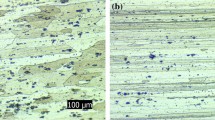Abstract
The present work describes the effect of welding parameters on the tensile properties and fatigue behaviour of 2014-T6 aluminum alloy joints produced by friction stir welding (FSW). Characterization of the samples has been carried out by means of microstructure, microhardness, tensile properties and fatigue behaviors. The hardness in the softened weld region decreases with decreasing the welding speed. Irrespective of the tool rotation speeds, the best tensile and fatigue properties were obtained in the joints with the welding speed of 80 mm/min. The joint welded with a rotating speed of 1520 rpm at 80 mm/min has given a highest tensile and fatigue properties. The fatigue behaviors of the joints are almost consistent with the tensile properties, especially elongations. Higher ductility in FSW joints made the material less sensitive to fatigue. The location of tensile fractures of the joints is dependent on the welding parameters. On the other hand, the fatigue fracture locations change depending on the welding parameters and stress range. In addition, a considerable correlation could not be established in between heat indexes and mechanical properties of FSW 2014-T6 joints under the investigated welding parameters.












Similar content being viewed by others
References
Thomas W M, Nicholas E D, Needham J C, Church M G, Temple-Smith P, and Dawes C J, GB Patent Application, No. 9125978-9 (1991).
Mishra R S, Ma Z Y, and Charit I, Mater Sci Eng A 341 (2003) 307.
Zhao Y h, Lin S b, Wu L, and Qu F x, Mater Lett 59 (2005) 2948.
Ren S R, Ma Z Y, and Chen L Q, Scr Mater 56 (2007) 69.
Rajamanickam N, and Balusamy V, Indian J Eng Mater Sci 15 (2008) 293.
Vural M, Ogur A, Cam G, and Ozarpa C, Arch Mater Sci Eng 28 (2007) 49.
Lockwood W D, Tomaz B, and Reynolds A P, Mater Sci Eng A 323 (2002) 348.
Dawes C J, in Friction Stir Welding, in Training in Aluminium, Application Technologies-TALAT, European Aluminum Association, in CD-ROM Lectures 4410 (1990).
Babu G R, Murti K G K, and Janardhana G R, ARPN J Eng Appl Sci 3 (2008) 68.
Ericsson M, and Sandström R, Int J Fatigue 25 (2003) 1379.
Dickerson T, Shi Q, and Shercliff H R, in 4th Int. Symposium on Friction Stir Welding Heat Flow into Friction Stir Welding Tools,, Park City, UT, USA (2003).
Jata K V, and Semiatin S L, Scr Mater 43 (2000) 743.
Salem H G, Reynolds A P, and Lyons J S, Scr Mater 46 (2002) 337.
Aydin H, Bayram A, Uğuz A, and Akay S K, Mater Des 30 (2009) 2211.
Uematsu Y, Tokaji K, Shibata H, Tozaki Y, and Ohmune T, Int J Fatigue 31 (2009) 1443.
Aydin H, Bayram A, Yıldırım M T, and Yiğit K, Mater Sci Medziagotyra 16 (2010) 311.
Zhou C, Yang X, and Luan G, Scr Mater 53 (2005) 1187.
Lomolino S, Tovo R, and dos Santos J, Int J Fatigue 27 (2005) 305.
Dickerson T L, and Przydatek J, Int J Fatigue 25 (2003) 1399.
Di S, Yang X, Luan G, and Jian B, Mater Sci Eng A 435–436 (2006) 389.
Turkish Standard, TS 138 EN 10002-1, Metallic Materials—Tensile Testing—Part 1: Method of Test at Ambient Temperature, Turkey (2004).
Salem H G, Scr Mater 49 (2003) 1103.
Aydin H, Bayram A, and Durgun I, Mater Des 31 (2010) 2568.
Mahoney M W, Rhodes C G, Flintoff J G, Bingel W H, and Spurling R A, Metall Mater Trans A 29 (1998) 1955.
Mishra R S, and Ma Z Y, Mater Sci Eng R 50 (2005) 1.
Sato Y S, Kokawa H, Enomote M, and Jogan S, Metall Mater Trans A 30A (1999) 2429.
Benavides S, Li Y, Murr L E, Brown D, and McClure J C, Scr Mater 41 (1999) 809.
Jata K V, Sankaran K K, and Ruschau J, Metall Mater Trans A 31 (2000) 2181.
Denquin A, Allehaux D, Campagnac M–H, and Lapasset G, in Proceedings of The Third International Symposium on Friction Stir Welding, Microstructural Evolution and Strength Mismatch Within a Friction Stir Welded 6056 Aluminium Alloy, Kobe, Japan (2001).
Cavalierea P, Squillace A, and Panella F, J Mater Process Technol 180 (2008) 364.
Cavaliere P, and Panella F, J Mater Process Technol 206 (2008) 249.
Author information
Authors and Affiliations
Corresponding author
Rights and permissions
About this article
Cite this article
Aydin, H., Tutar, M., Durmuş, A. et al. Effect of Welding Parameters on Tensile Properties and Fatigue Behavior of Friction Stir Welded 2014-T6 Aluminum Alloy. Trans Indian Inst Met 65, 21–30 (2012). https://doi.org/10.1007/s12666-011-0069-6
Received:
Accepted:
Published:
Issue Date:
DOI: https://doi.org/10.1007/s12666-011-0069-6




